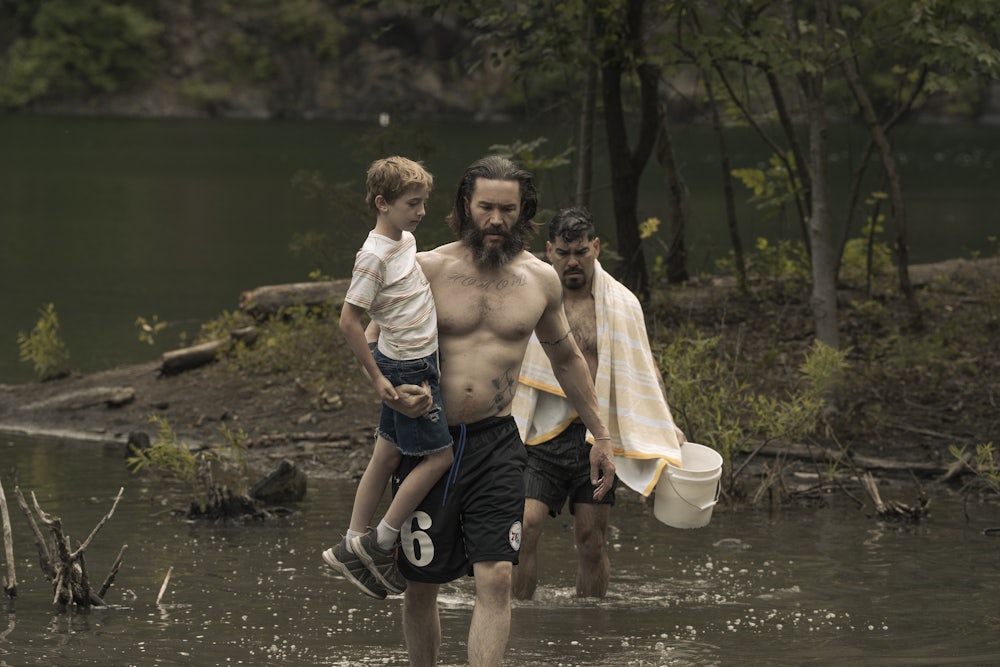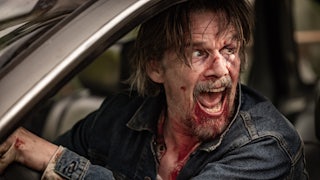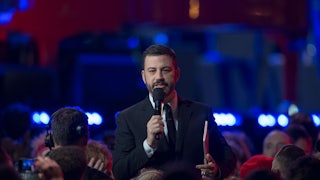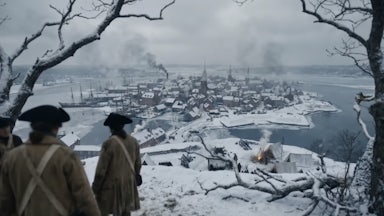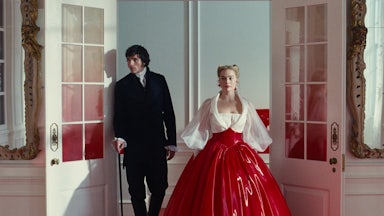We are often told that there is a crisis of boys and men in this country. They’re depressed, aimless, susceptible to malign persuasion. They’re underperforming at school, at work, in their social lives. They’re afraid of saying the wrong thing, and so they are taken in by charlatans who encourage them to say the wrong thing loudly. It’s so bad that interventions need to be made early and often. Kindergarten, Title IX, the disproportionately female corps of teachers in American schools—the institutions have failed boys, and so, finally, the institutions need to be either reformed or gamed.
There is, thankfully, a lot of healthy skepticism going around about the root causes, or even existence, of many of these apparent structural problems. Reviewing the evidence in a recent essay, the New York Times parenting columnist Jessica Grose concluded that “we are identifying the root of boys’ problems based on vibes rather than real evidence.” The correlation between female teachers and boys’ underperformance is sketchy at best, for instance. And the Title IX narrative falters when you realize that girls have been outperforming boys in school since 1914. But still, the vibes persist.
Netflix’s recent hit agitprop miniseries Adolescence was very much an outgrowth of this vibe ecosystem. Its main character was a sweet-looking young boy who brutally murders a young girl, its tragedy largely framed as that of masculinity gone haywire. What’s happened to our boys? But, in the end, the show, which never focused on the murdered girl and tried its hardest to focus on the young murderer, couldn’t really manage either. Instead, it turns out, it was about the dad. It’s striking, in retrospect, how many of the foundational series of the prestige TV revolution share this focus on dadly angst. Tony Soprano bemoaned the loss of strong silent types like Gary Cooper; Don Draper dealt with the problem of being Gary Cooper. And, while fatherhood was not the primary arc of any of those foundational antiheroes, it was one way through which we could interrogate their complicated sense of morality.
HBO’s new hit drama Task, which came to its end this past weekend, is about dads too. They’re also morally complicated, betwixt and between the law and the family. But Task feels unmistakably different from those shows. There was, in those antihero series, an allure to the toxic masculinity of the leads, a magnetism to their misdeeds. Their home lives were corroding as the cost of doing business, but their lives outside the home were thrilling enough for us to forget the home front. Task is, if anything, the inverse of this kind of show. Rather than understand fatherhood as a medium through which to frame these characters’ grim pursuits outside the home, Task shows us men whose criminal obsessions are a medium through which to understand their domestic entanglements.
The unusual thing about this week’s finale is that it was a bit unclear, going in, what we were waiting to have resolved. What, of our task, was left to be accomplished?
From the start, Task was more clearly a crime saga than a mystery of any real sort. Robbie (Tom Pelphrey) and his pals robbed the stash houses of a biker gang called the Dark Hearts as payback for their murder of Robbie’s brother. Robbie lives in his brother’s old house with his grown niece, Maeve (Emilia Jones), who steps in to take care of both of Robbie’s kids. In the first episode, Robbie’s score goes awry, a bunch of people are dead, and Robbie kind of gently abducts a young boy named Sam who was, unwittingly, a witness to his parents’ own murder. On the case is Tom (Mark Ruffalo), a traumatized FBI agent dealing with the recent murder of his wife at the hands of his adopted son. Tom’s cajoled back into active duty to shut down the stash house robberies, and, despite the apparent mole(s) in his unit, he largely succeeds over the course of the series. And while much of our weekly viewing is punctuated by spring-loaded twists, the show is not really about whodunit or why, which put the finale in a strange place.
By the end of the cold open of last week’s penultimate episode, Robbie was dead. We knew who the rats in both the FBI and the Dark Hearts biker gang were and why. We knew that Sam, the cutest little boy on television, was relatively safe—or at least in custody—and we knew what happened to the drugs and the money. Even though Task was never really a mystery series, the lack of any real remaining mystery leading up to the finale was striking. Were we just in line for an episode-length coda?
Even if that were the case, the status of that coda was up in the air. Was this a show about faith? Ex-priest Tom gets to deliver Robbie a kind of last rites in the style of that one scene from Heat. Then we get to see him in his garden like St. Francis of Assisi, at peace with the sacrifices he’s made and must continue to make. Was it a show about justice? All the Dark Hearts get what’s coming to them for being such gruesomely violent and vain psychopaths, while, at the same time, both Maeve—who turns in Sam despite likely jail time as an accessory—and Tom’s son are shown mercy. Was it a show about trauma? Robbie and Tom and Maeve and even the Dark Hearts brain trust are all acting out of complicated, usually pretty ill-advised, responses to trauma in their lives. Maybe the resolution of the series was about what happens to all that trauma when its container finally bursts.
After all, the finale was about all of those things. But, perhaps more than I expected, the show ended by focusing on the question of what exactly is happening with all these boys, middle-aged ones included. As the critic Sophie Gilbert wrote, early on in the series, this focus on fraught masculinity was always Task’s horizon. Especially in comparison with creator Brad Ingelsby’s prior hit, Mare of Easttown, Task conspicuously insisted on keeping its female characters marginal or absent entirely, she noted. “The world it depicts is one that women simply can’t seem to endure,” she wrote. “They get hurt or killed, or they vanish altogether. The bonds in Task are between men and other men, whether the backdrop is a barroom or a church; the loyalties, power structures, rivalries, and affections are all patriarchal.”
Indeed, in addition to all the women who are killed in the show, Maeve’s life is constricted by the choices of first her father and then Robbie; Tom’s youngest daughter’s life has been battered and bruised by the choices of her adopted father and biological brother; Tom’s eldest daughter only appears on our screen because she’s been betrayed by her father, her brother, and her philandering husband; and then there are all those women at the mercy of the Dark Hearts, keeping house while they go on their little bike rides. Task, in the end, had a lot to say about this kind of masculinity that you can’t be around unless you want to get hurt. And it said a lot of those things through the prism of fatherhood.
There’s a scene in the middle of the show’s first episode that feels, in retrospect, like a skeleton key for everything that comes after. Robbie is feeling good after a successful robbery earlier in the episode. The show takes us into his point of view, meandering shirtless around the house, pumping some tunes in his headphones. In his celebratory mood, he creeps down into Maeve’s room to scam a joint out of her personal stash. While in her closet, he realizes that Maeve has come home with a date. He remains trapped there as they begin to hook up, but, sensing that his opportunities for escape are dwindling, he bursts out. Maeve’s date, quite intuitively, confronts the stranger who’s just leapt out of the closet, and Robbie takes offense, violently throwing him out of the house. Some time later, Robbie slinks out on the porch to apologize to a furious Maeve. Their ensuing conversation contains a lot of what the show has to say about Robbie as a character, but also delineates the boundaries of Task’s map of confused masculinity.
“Sorry,” Robbie squeaks out. There’s a long pause, and he finally breaks the ice: “It’s just, you know, he raised his hands at me in my house …” Maeve incredulously interrupts, “Your house?” Robbie does a very familiar thing here. His eyebrows rise, and he corrects himself, responding knowingly to what he perceives to be a bit of a hysterical overreaction from Maeve. “Uh. OK. My brother’s house,” he corrects himself. But he hasn’t quite hit it. “No,” Maeve replies, “my house. It passed down to me when my dad died, which I allowed you to move into when you lost yours.” Still in his condescending, conciliatory tone, Robbie says, “OK, let’s talk about this tomorrow.”
The conversation continues, but this cascading set of slippery assumptions tells us a lot. First, there’s Robbie’s assumption that Maeve will recognize and forgive the intrusion based on his justification that a man had “raised his hands” at him, that Maeve is intuitively respectful of this kind of dudely honor code. Second, and more importantly, Robbie assumes it’s his house simply because he lives in it. That his moving into this house constitutes a like-for-like replacement of Maeve’s father and a tacit inheritance of all parental authority and personal property. But Robbie is neither the inheritor of the house in law nor in deed. He not only refuses to contribute to the upkeep of this home or the raising of the children—his—inside of it, but he teases and mocks Maeve for her awkwardness in performing all these tasks herself. When he abducts Sam at the end of this episode, the child becomes a liability to Robbie, but he becomes a daycare problem for Maeve. He’s tender in the moments he spends with his kids, tragically so, but he’s barely a father to them, let alone the kind of father figure he pretends to be in this argument with Maeve. Robbie’s claim on this house is entirely imaginary.
Later in the argument, after Maeve lambastes him for his absentee parenting, for the disproportionate load of domestic and emotional labor he’s foisted on her, and for his life of petty crime, Robbie tries on the role of the breadwinner. “I’m doing it for this family so we can stay in this house,” he says, “You know what? You wanna go so bad? Fine. We’ll be fine without you. We’ll certainly fucking eat better.” Maeve throws a drink in his face. “It’s not your house, asshole,” she replies. And Robbie returns, immediately, with, “It’s not yours either. It’s my brother’s. My brother’s. I can handle things here on my own.” Again, here’s this man, soft underbelly intact, full of the righteousness of noble vengeance, espousing an essentially fantastical view of his own living situation, his own relationship with the only vestige of his brother that remains. Robbie is not living in the same reality as Maeve, which is one way of describing his trauma response, or a way of describing his romantic ideal of manhood.
It’s tempting, here, to read Robbie as a garden-variety chauvinist, a thoughtless adherent to outdated gender roles and codes of manly honor. But it’s more accurate to say he’s a little brat. His surprised reaction to Maeve’s indignation isn’t that of a husband flying off the handle; it’s that of a child who thinks he’s the main character in every conversation, the hero of every tragic tale.
If the mythical crisis of boys and men is a vibes-based one, as Grose suggests, then Task is an anatomy of those vibes. It is filled everywhere with men, fathers and surrogate fathers mostly, whose sense of personal grievance and imagined manly virtue is matched only by their childishness. Tom is so overwhelmed by grief over his wife that he drinks himself stupid every night from a commemorative Phillies cup until his daughter has to put him to bed. Grasso, the rat from Tom’s task force, won’t sleep with his divorcee crush in her “marriage bed” because he has the stunted Catholic morality of a boy at his first communion. But he also justifies his betrayal of the task force with the same heroic breadwinner dream as Robbie.
And then there are the bikers. In the olden days of prestige TV, Sons of Anarchy gave us a biker gang full of Shakespearean archetypes and operatic plot lines, but Task has the bravery to present the members of the Dark Hearts as a collection of callow, self-serious buffoons in Halloween costumes. Their pageantry and their occult bureaucracy mask the fact that—as their sit-down with a Dominican drug lord makes clear—the only reason they have a criminal organization at all is that the racist junkies in their area prefer to buy drugs from white guys. That the elders of this group raise up their lieutenants with fatherly care, passing on the wisdom of ages, offering protection they can never really promise, is one of the show’s most stinging ironies. They raise their sons to act without strategy, only with impulsive rage, and then they kill them for it.
The men of Task are all fools. They use fatherhood as a shield for their selfishness. They believe themselves to be bringing justice to an unjust world, but, often, they themselves are the sources of that injustice. And the people who suffer alongside that holy quest are, each and every one of them, women who know better.
The crescendo of the season finale isn’t a big reveal or a climactic confrontation. The episode winds to its ending with a speech from Ruffalo’s Tom, the only father left alive at the end of the show. He’s delivering a statement at the sentencing hearing of his son. It’s not a romantic speech or one that seeks to mythologize either his role as a savior or a sinner, though both are mentioned. It’s jarring, in fact, how plain the speech is. But it’s also not the end. Afterward, we watch Tom as he renews his joy for life as a foster father for little Sam. They dig in the garden, we see pictures on the fridge of the young boy smiling alongside his new family. But that’s not our resolution. Instead, it’s Tom’s decision not to adopt Sam. We see him agonize over it, and we see him greet Sam’s new family with the same hospitality we once saw him greet his own son and daughter with in flashback.
Fatherhood, Tom seems to understand, is not the solution to his problems. He can’t just keep dadding his way to salvation. In the next and final scene, we see Maeve packing up Robbie’s orphaned children and driving off into the distance, presumably to some country where she’ll no longer find herself responsible for all these crises of men.
